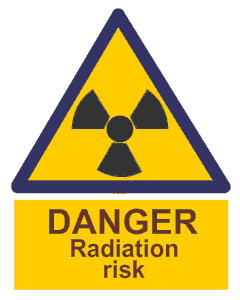Radiation
- medical procedures
- the food you eat
- the house you live in
- a coal-burning power plant
- a nuclear power plant
Radiation is a natural part of the environment. While nuclear power plants pose the threat of radiation exposure, so do many other parts of our environment. Radiation is measured in units called millirems. Take this interactive online quiz to see how many millirems of radiation you may be exposed to in your everyday life.
Scientists estimate that most of us are exposed to about 350 millirems per year and that exposure to 1 millirem takes about 2 minutes from your life expectancy. So if you live to be 80 years old, an annual exposure of 350 millirems may take about 38 days off your life.

Radiation is just a natural consequence of the nuclear fission reaction used to power nuclear plants. The containment structures of the nuclear power plant, strict safety regulations, and legislative guidelines on how nuclear wastes are handled prevent serious threats of radiation to the environment during normal operations. But as you saw with Chernobyl, all it takes is one serious accident to bring about a lot of harm. The nuclear reactors used in the US have different designs than the Chernobyl plant and are considered much safer. The risk of exposure to radiation from a nuclear power plant in the US and most other parts of the world is extremely low. The US Nuclear Regulatory Commission (NRC) sets guidelines for the nuclear industry’s safety.
Proponents of nuclear energy point out that more people die from air pollution caused by fossil fuel burning every year than they do by exposure to radiation from a nuclear power plant. Statistics point out that about 16,000 deaths will be attributed to air pollution this year in just the US. Barring extremely major nuclear power plant accidents, that number is much higher than the number of individuals harmed by nuclear power plant radiation.
Is there a nuclear power plant near you? Find out at the Energy Information Association.